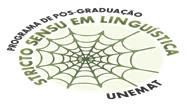Banca de QUALIFICAÇÃO: MARIBEL CHAGAS DE ÁVILA
Uma banca de QUALIFICAÇÃO de DOUTORADO foi cadastrada pelo programa.DISCENTE : MARIBEL CHAGAS DE ÁVILA
DATA : 15/03/2022
HORA: 08:00
LOCAL: Sala virtual de Defesa da PPGL/UNEMAT
TÍTULO:
HAITIAN REFUGEES IN CACERES, ON THE BRAZILIAN BOLIVIA - MT BORDER: A CASE STUDY ON THE LEARNING OF PORTUGUESE AS AN ADDITIONAL LANGUAGE FROM THE PERSPECTIVE OF COMPLEX DYNAMIC SYSTEMS
PALAVRAS-CHAVES:
Portuguese for refugee Haitians. Learning dynamics of PLAc and Online Technologies. Complex Dynamic Systems.
PÁGINAS: 185
GRANDE ÁREA: Lingüística, Letras e Artes
ÁREA: Lingüística
SUBÁREA: Lingüística Aplicada
RESUMO:
This study aims to analyze, by the bias of the Complex Dynamic System Theory (HOLLAND, 1995; LARSEN-FREEMAN & CAMERON, 2008; PAIVA, 2011; MORIN, 2013; LARSEN-FREEMAN, 2017), the dynamics of the learning process of an portuguese additional language (LA) in an immersion context lived by a group of four Haitian people, in Brazil-Bolivia border, in the city of Caceres – MT. The interest to develop this research emerges from the complexity that surrounded Portuguese learning as an additional language in the immersion context crossed by the technology. In this sense, it is important to problematize the issues involved in the Portuguese learning process by the researched Haitians, seeking to reach a citizen status enable to live and work with the daily complexity. In the contemporaneity, the research related to the learning of an additional language in a refugee context inserts the UNEMAT and the border area of Mato Grosso between the most concerns of the researchers, which are pursuing to comprehend in which way the learning of an additional language works for people that had to leave their mother language and culture to live diversity of experiences in the perspective of Portuguese Welcome Language (PLAc) in Brazil. The use of this terminology seeks to evidence this learning, research, and extension contexts, looking to foment the field interesting and its institutionalization, still very incipient in our country. To execute this case study, qualitative and interpretive, the collection tools were interviews and google forms questionnaires with four Haitians, professors, and their employers, as well as observation during their PPE (Portuguese for foreign) classes at UNEMAT, and theory and practical classes, at CEJA and SENAI. In the analyses, registers as the learning dynamic happen on diverse spheres, in which four Haitians live with Brazilian and others foreign groups, concluding that there is an emergence of resignified propositions for teaching Portuguese for foreign, which enable the conditions for the implementation of learning practices that contribute to the foreign learner's linguistic competence and citizenship. From those discussions, it is a point that the linguistic and humanitarian reception are primer factors in the context of the complex languages learning researched because the self-organization and adaptation happen, although there is a lack of public laws in the complexity of contemporary society.
MEMBROS DA BANCA:
Presidente - 39626001 - VALDIR SILVA
Interno - 314.500.911-72 - LUCIA MARIA DE ASSUNÇÃO BARBOSA - UNEMAT
Interno - 260.313.106-00 - OLIMPIA MALUF SOUZA - UNEMAT
Externo à Instituição - LEANDRO RODRIGUES ALVES DINIZ - UFMG
Externo à Instituição - RONALDO GOMES JUNIO - UFMG



